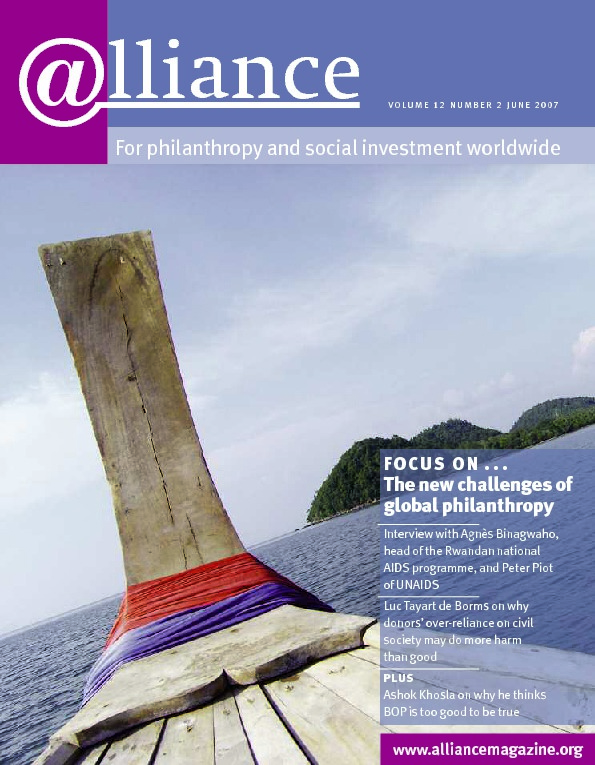Kumi Naidoo Elevator speech to Bill Gates
To make a real and sustained difference, one must address the underlying causes of poverty and not only its symptoms. Service delivery alleviates only some of the effects of poverty. The root causes of poverty are ineffective states and weak or even repressive policies that restrict people’s access to security, services and opportunities. To address them, one must create an enabling environment, promote participatory democracy, and support citizens in holding decision-makers to account. By investing in advocacy and encouraging policy changes that uphold citizens’ rights, you will be tackling the causes of poverty, not just the effects, defending human rights and building stronger societies for the future.
Venkat Krishnan Elevator speech to a funder with €500,000 a year
€500,000 is too small an amount to agonize over. Your best shot is to put all the money in one basket – pick one single organization in one country. It doesn’t matter what you support – build a school or a small dam, or fund an advocacy campaign – any problem in any developing country needs a lot more than you have. So pick an idea or a cause that excites you, find the one organization that you feel excited about, give them all the money as an upfront, untied donation, and focus the rest of your energies on the rest of your money. If it works, it will change a country. If it doesn’t, it’s the cost of one day’s paper usage in the UN system.
Andrés Thompson Elevator speech to Bill Gates
To make better use of your funds internationally, have you ever thought of convening different voices from the developing world and listening to what they have to say, what their concerns are, what their vision is, and what they think needs to be done to make another world possible? Please give some thought to this simple but powerful idea. This is my floor. I hope we bump into each other again.
Rory Tolentino Elevator speech to a funder with €500,000 a year
If you are passionate about a particular issue, talk to a few people from the countries you are interested in helping about how the various sectors are dealing with that issue and find out how you can help, either by supporting efforts to solve the problem or by identifying a different means of solving it. That way, your funds are used to address an issue more strategically. You will be working with organizations and people who have been dealing with this longer, and in the process strengthening both their efforts and yours.
Atallah Kuttab Elevator speech to Bill Gates
Enormous problems need funds but, more important, they need motivated people. Before making any investment, make sure the people affected define the problem for themselves. If they do, they’ll be involved and engaged in finding the solution. The same goes for defining the results. Solutions and results are subjective and you can’t assume agreement on what they are, so you need consensus here, too, among the people affected by the problem. Another thing: results need to be defined in stages so that each stage produces its own success. This builds the momentum for tackling the problem and achieving the end results. So the key message is, important as money is, the engagement of people affected by the problems we are trying to solve is still more so.
Fernando Rossetti Elevator speech to a funder with €500,000 a year
Invest in the production and dissemination of information on one central issue, such as violence or unemployment, for a long period of time. First, establish partnerships with one or more local organizations. Identify the issue, the country and the partners through a project selection process. A grantmaker support organization can help in publicizing this process and checking who are the best recipients. In developing countries, good information is rare, but conveyed through events, publications and training programmes, it’s crucial for sustainable social transformation.
Akwasi Aidoo Elevator speech to Bill Gates
Africa’s problems require two approaches that donors do not pursue often enough. The first is disseminating policy successes across Africa. True, South Africa is not Senegal, but there is a lesson, for example, that Senegal can offer South Africa on HIV/AIDS. With a strong policy commitment, Senegal has maintained a less than 1 per cent rate of HIV/AIDS. That’s where donors come in – helping to disseminate successes like this. The second approach is strengthening civil society. Senegal shows that an effective civil society is vital for stimulating government to tackle problems. So, whether you work on HIV/AIDS or malaria, you should prioritize strengthening civil society advocacy.
Jorge Villalobos Elevator speech to a funder with €500,000 a year
If you’re trying to tackle the problems faced by developing countries with limited resources, you need to do five things: fund projects which deal with the cause of a specific problem – not its effects – and look for those that have the largest social impact; allocate some of the funds to an analysis of the needs and assets of the community, taking into consideration the perspective of that community; give people the tools to solve their own problems and establish measurable results; choose projects that are financially sustainable, and that can be replicated by donors and civil society organizations; promote cross-sector strategic alliances so that the resources you put in might attract matching funds.
Marcos Kisil Elevator speech to Bill Gates
First, think about whether the problem you want to address is a cause or an effect. Is it a result of lack of knowledge or lack of action? Is it a cultural, economic, political or scientific problem or a mix? Next, identify and value the existing assets of the people affected: their knowledge, past experiences, resources, etc, then look at what’s being done to address similar problems elsewhere. Bring together those who have the knowledge and resources to solve the problem with those who are its victims in a jointly owned process tackle it.






Comments (0)